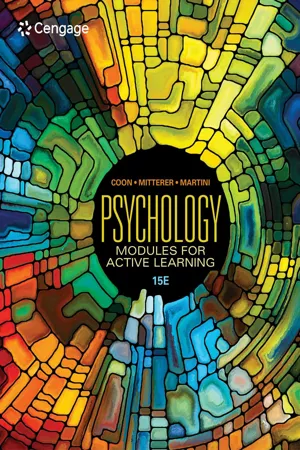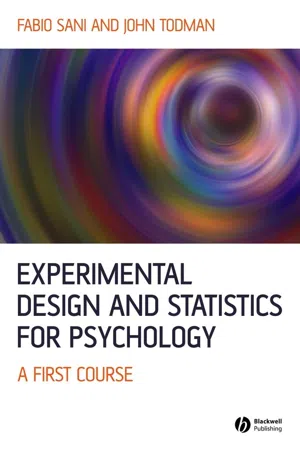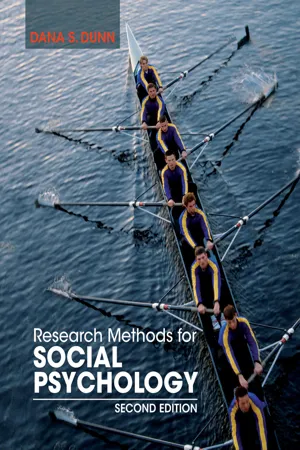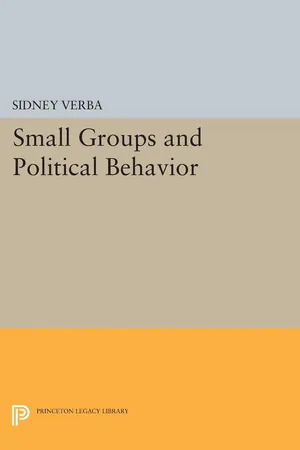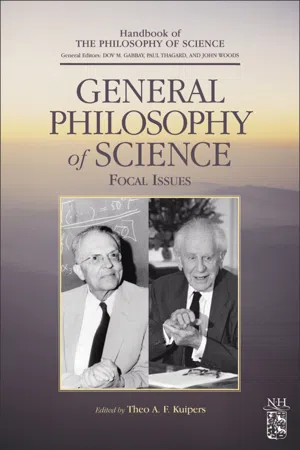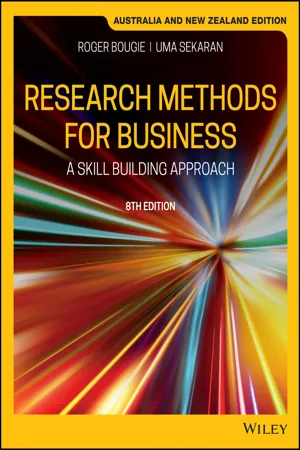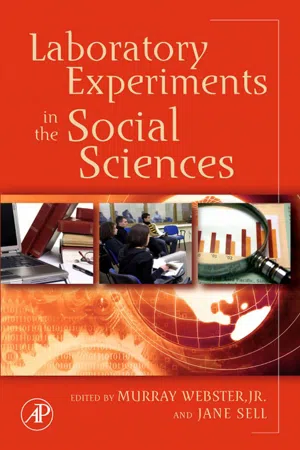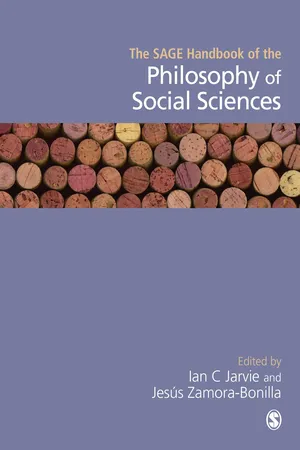Psychology
Lab Experiment
A lab experiment is a research method used to study human behavior in a controlled environment. It involves manipulating independent variables to observe their effects on dependent variables. This method allows researchers to establish cause-and-effect relationships and control extraneous variables, providing valuable insights into psychological phenomena.
Written by Perlego with AI-assistance
Related key terms
1 of 5
10 Key excerpts on "Lab Experiment"
- eBook - ePub
Great Ideas in Psychology
A Cultural and Historical Introduction
- Fathali M. Moghaddam(Author)
- 2013(Publication Date)
- Oneworld Publications(Publisher)
2THE PSYCHOLOGY LABORATORY
For thousands of years philosophers speculated about the characteristics of human thought and action, but it is only relatively recently that systematic and controlled methods for testing such speculations have been developed. The progress made by modern psychology has been possible because of one method in particular: the psychology laboratory experiment , an experiment conducted in a separate physical space in which all the important characteristics can be controlled. The laboratory has gained a uniquely important place in psychology. The currently dominant school of psychology, cognitive psychology, relies heavily on the laboratory method. The cognitive approach pervades all research domains, including the domain of social psychology , the scientific study of individual behavior in social contexts, where over eighty percent of studies are conducted in the laboratory. What explains this dominance of the laboratory method in psychology? Why are survey methods, or observation methods, or open interview methods, or discourse analysis methods not the most often used by psychologists?A major reason for the popularity of the laboratory method is the superior level of control achieved by studying specific features of the individual isolated in a laboratory, relative to that achieved in other research methods, including surveys, observational procedures, and interview methods. Through a high level of control of all the factors in a situation, researchers can examine connections between independent variables, assumed causes, and dependent variables, assumed effects. This I call the causal assumption , which proposes that all behavior is determined by cause(s). Greater control achieved in the laboratory leads to higher reliability , meaning that experimental procedures can be replicated and results can be repeated. However, critics have raised questions about validity - eBook - PDF
Psychology
Modules for Active Learning
- Dennis Coon, John Mitterer, Tanya Martini, , Dennis Coon, John Mitterer, Tanya Martini, (Authors)
- 2021(Publication Date)
- Cengage Learning EMEA(Publisher)
The experimental method allows the careful control of con-ditions to bring cause-and-effect relationships into sharp focus (Stangor, 2015). Hence, it is generally accepted as the Experiment A study in which the investigator manipulates at least one variable while measuring at least one other variable. Like Chan, we all conduct little experiments to detect cause-and-effect connections. In a more formal way, that is exactly what psychologists do when they want to understand why we act the way we do. Let’s see why. Copyright 2022 Cengage Learning. All Rights Reserved. May not be copied, scanned, or duplicated, in whole or in part. Due to electronic rights, some third party content may be suppressed from the eBook and/or eChapter(s). Editorial review has deemed that any suppressed content does not materially affect the overall learning experience. Cengage Learning reserves the right to remove additional content at any time if subsequent rights restrictions require it. PSYCHOLOGY MODULES FOR ACTIVE LEARNING 38 most powerful scientific research tool. To perform an ex-periment, you would do the following: 1. Directly vary a condition that you think might affect behavior. 2. Create two or more groups of participants. These groups should be alike in all ways except the condition you are varying. Usually, one group serves as a control group with which the other groups are compared. 3. Record whether varying the condition has any effect on behavior. Suppose that Chan just happened to be a psychologist who wanted to find out if using smart glasses while driving af-fects the likelihood of having an accident. First, he would form two groups of people. Then he could give the members of one group a test of driving ability while using their smart glasses. The second group would take the same test without using smart glasses. By comparing the average driving abil-ity scores for the two groups, he could tell if the use of smart glasses affects driving ability. - eBook - PDF
Experimental Design and Statistics for Psychology
A First Course
- Fabio Sani, John Todman(Authors)
- 2008(Publication Date)
- Wiley-Blackwell(Publisher)
For instance, you could rely on the systematic observation of behaviour. This is what psychologists who are interested in animal behaviour tend to do. Basically, animal psychologists go where the animals live, or create an artificial environment in which animals are placed, and then they observe and record animals’ behaviour through the use of established procedures. For example, a psychologist who is interested in, say, the behaviour of chimps could use systematic observation to demonstrate that a high amount of time devoted to ‘grooming’, that is, reciprocal cleaning and brushing among a group of chimps, leads to more frequent cooperative activities in the group. However, the technique that is most often used by psychologists – as well as scientists in many other disciplines – is the experiment . Experiments constitute a very powerful technique for the investigation of causal links between different things, and this is why they are ideal for testing causal hypotheses. Experiments are typically run in laboratories (although it is possible to conduct them in more natural settings too). Because, as specified above, a hypothesis states that a specific change in one thing will produce (cause) a specific change in another thing, experiments are based on the creation of a situation in which a change in one thing is artificially produced, and the corresponding change in another thing is systematically observed. This book – with the exception of Chapter 10, in which we deal with non-experimental research – is entirely devoted to the use of the experiment as a method of hypotheses testing. To conclude this chapter, it is necessary to make a further observation on the research process. - eBook - PDF
- Dana S. Dunn(Author)
- 2012(Publication Date)
- Wiley(Publisher)
Most articles contain several experiments that are “packaged” to illustrate a main or original hypothesis, as well as variations on it. (Use PsycINFO or some other database to search out some recent articles in social psychology journals to verify this point.) The qualities of a true experiment are now established. As we will learn later, true experiments are not the only research approaches embraced by social psychologists (see Chapter 5). Some social phenomena do not lend themselves to laboratory investigation—they must be studied out in the world, in everyday life, where control is less certain and at times nonexistent. In the meantime, however, we need to consider what specific advantages experiments offer. The advantages of experiments One goal of science is to offer an unbiased view of how and why things happen as they do. The goal of social psychology is similar: To offer an unbiased explanation of why people think, feel, and behave as they do in social situations. Critical, informed observation in the form of experimentation is crucial to both pursuits. Why are experiments the sine qua non—the truly indispensable part—of social psychology? Experiments provide certain advantages that other research approaches aimed at explaining the intricacies of social life do not. These advantages include Careful control. People are not things; they act and react. Except for participants’ behavioral reactions, then, virtually everything that happens in the course of an experi- ment should be accounted for. Such control allows researchers to rule out alternative explanations for obtained results and to speculate about the social psychological processes that led to the observed behavior. Measurement. Experimentation is not just about introducing change—it also involves assessing subsequent change. To verify that one variable affects another, experiments rely on well thought out measures to demonstrate that something happened as a result of something else. - eBook - PDF
Small Groups and Political Behavior
A Study of Leadership
- Sidney Verba(Author)
- 2015(Publication Date)
- Princeton University Press(Publisher)
We shall be especially interested in seeing if the precision of the experimental method requires that we pay the price of relevance. The laboratory method for the study of political affairs will be useful if it serves to "narrow the gap between being precise about the trivial and trivial about the important." 4 The Experimental Method CONTROL: The most significant characteristic of the experi- mental method is the control that the experimenter has over the situation. By manipulating certain carefully selected variables and by controlling, ideally, all others, he can achieve 3 Medical researchers can of course dissect cadavers, but the political scientist has the historian to do this for him. * Harold Lasswell, "Current Studies of the Decision Process: Automation v. Creativity," Western Political Quarterly, 8 (1955), p. 386. 63 THE CULTURE OF THE LABORATORY clear and unambiguous connections between the independent variables he controls and the dependent variables he is study- ing. "A laboratory experiment may be denned as one in which the investigator creates a situation with the exact conditions he wants to have and in which he controls some, and manipu- lates other, variables. He is then able to observe and measure the effect of the independent variables on the dependent vari- ables in a situation in which the operation of other relevant factors is held to a minimum." 5 Furthermore, the experimenter, having planned the experimental situation, is able to apply more precise observational tools and techniques than he could use in less controlled situations; and the results of his study can be verified by replications of his work. According to Woodworth, the advantages of the controlled experiment are: 1. The experimenter makes the event happen at a certain time and place and so is fully prepared to make an accurate observation. - eBook - PDF
- Dov M. Gabbay, Paul Thagard, John Woods(Authors)
- 2007(Publication Date)
- North Holland(Publisher)
Experimental economics — mainly in the case of Reinhard Selten — is well aware of this question and tries to emphasize the laboratory experimentation as the most reliable kind of experimentation to deal with the predictive success (and, therefore, with the notions of accuracy and precision). Nevertheless, he also points out limits: “experimental research (. . . ) cannot replace field research. The institutional environment of economic participants must be investigated in the real world. Once we are sure we have modeled such an environment, however, we can and must test or redevelop the behavioral assumptions of theory in the laboratory” [Selten, 2003, 68]. 2.2 Laboratory experiments Although a laboratory experiment is performed in a material setting (a location where the experiment is conducted), the relevant factors are epistemological and methodological: the economic environment should be under the control of the experimenter. “This distinguishes laboratory experiments from ‘field’ experiments, in which relatively few aspects of the environment can be controlled, and in which only limited access to most of the economic agents may be available. It is precisely this control of the environment, and access to the agents (sufficient to observe and measure attibutes that are not controlled) that give laboratory experiments their power” [Roth, 1988, 974/1993, 3]. The basic level is in the study of some economic processes (bargaining, exchange relations, . . . ) and the search for stable or structural features of economic behavior associated to them (while bargaining, in auctions, . . . ). Much of what is done in laboratory experiments is thought of as addressing problems that are not studied in other branches of economics. Thus, it seems that aims, processes and results of laboratory experiments in economics relate to aspects of economic phenomena that, in principle, are not investigated by other kinds of economic research. - eBook - PDF
Research Methods For Business
A Skill Building Approach
- Roger Bougie, Uma Sekaran(Authors)
- 2021(Publication Date)
- Wiley(Publisher)
It is also necessary to manipulate the independent variable so that the extent of its causal effects can be established. The control and manipulation are best done in an artificial setting (the laboratory), where the causal effects can be tested. When control and manipulation are introduced to establish cause-and-effect relationships in an artificial setting, we have labora- tory experimental designs, also known as Lab Experiments. Because we use the terms control and manipulation, let us examine what these con- cepts mean. CONTROL When we postulate cause-and-effect relationships between two variables X and Y, it is possible that some other factor, say A, might also influence the dependent variable Y. In such a case, it will not be possible to determine the extent to which Y occurred only because of X, since we do not know how much of the total variation in Y was caused by the presence of the other factor A. For instance, a Human Resource Development manager might arrange special training for a set of newly recruited secretaries in creating Web pages, to prove to the VP (his boss) that such training causes them to function more effectively. However, some of the new secretaries might function more effectively than others mainly or partly because they have had previous intermittent experi- ence with using the Web. In this case, the manager cannot prove that the special training alone caused greater effectiveness, since the previous intermittent Web experience of some secretaries is a contaminating factor. If the true effect of the training on learning is to be assessed, then the learners’ previous experience has to be controlled. This might be done by not including in the experiment those who already have had some experience with the Web. This is what we mean when we say we have to control the contaminating factors, and we will later see how this is done. - Murray Webster, Jane Sell(Authors)
- 2007(Publication Date)
- Academic Press(Publisher)
It is the case that some who conduct experiments in the social and behavioral sciences engage in rhetorical practices that suggest their results are directly generalizable without theory. This only weakens the apparent value of experimental research in the eyes of those who employ other research methods. Nevertheless, discounting or altogether rejecting laboratory methods because they do not directly generalize indicates a misunderstanding of the role that these kinds of experiments play in the research process. Issues of theory testing and external validity are no different for sociology than for any other field employing laboratory methods. Yet, (1) all laboratories in all sciences create artificial conditions, and (2) all sciences try to explain real-world phenomena, but (3) experimental methods are embraced proudly, unques-tioningly, and highly successfully by other sciences. Used properly, theory-driven experiments do not produce phenomena whose descriptions may be generalized to natural settings. These kinds of exper-iments test theories . Unfortunately, whenever experimentalists in psychology, social psychology, and sociology operate with less than explicit, a priori theories—which sometimes they do—their experiments disengage from their proper theory-testing function. When one is not actually testing hypotheses derived from theories, it may be tempting to infer that experiments are intended to serve as microcosms of real-world contexts, permitting the gener-alization of experimental findings to those natural settings. Even while some experimentalists encourage such interpretations, there is no basis for doing so (see Thye, 2000). As Webster and Kervin (1971, p. 269) explain: The proper use of the laboratory permits no direct generalization of laboratory results to the outside world; the only permissible connection between the two is the theory.- Ian C Jarvie, Jesus Zamora-Bonilla, Ian C Jarvie, Jesus Zamora-Bonilla, Author(Authors)
- 2011(Publication Date)
- SAGE Publications Ltd(Publisher)
30 Experiments F r a n c e s c o G u a l a INTRODUCTION While laboratory experiments are widely con-sidered a powerful method of investigation in the natural sciences, the social sciences seem to be stuck at a pre-Galilean stage of devel-opment, where the epistemic advantages and limitations of the experimental method are still controversial. The landscape, to be sure, is variegated: whereas in some disciplines, like economics, experimentation has made a breakthrough, in others, like political sci-ence, it is gaining a foothold with difficulty. 1 Meanwhile, laboratory research is still con-sidered marginal and is used only rarely by sociologists and anthropologists. Accounting for these differences would require an inquiry into the history of the vari-ous branches of the social sciences that goes well beyond the scope of this chapter. One claim, however, is true pretty much across the board: in spite of its controversial status within the social science, experimentation has always exerted an influence from the outside , that is, from those disciplines that use it regularly for the generation of scien-tific knowledge. The most important influ-ence has not come from the natural sciences, though, but from psychology . From a methodological point of view, experimental psychology had reached a high level of stability by the middle of the twentieth century, and had developed a set of tools that could be easily exported and applied in neighbour disciplines. 2 Given the affinity of their subject matter, it was more natural for social scientists to borrow methodologi-cal tools from psychologists than from, say, nuclear physicists. For the same reason it was easier for single experimental results to cross the disciplinary boundaries and be transferred from psychology to the social sciences. So quite paradoxically many social scientists have relied in their work on psy-chological findings produced using a meth-odology that was not highly regarded in their discipline.- eBook - PDF
- Roger Wimmer, Joseph Dominick(Authors)
- 2013(Publication Date)
- Cengage Learning EMEA(Publisher)
An informal content analysis of three mass communication journals for 2009 – 2010 found slightly different results. Surveys were used in about 35% of the studies, while experiments were used in 16%. We examine only the more basic techni-ques in this chapter, with discussions of the controlled laboratory experiment , quasi-experimental designs, and field experiments. For more information about advanced ex-perimental procedures, you should consult Christensen (2004) and Montgomery (2008). ADVANTAGES AND DISADVANTAGES OF LABORATORY EXPERIMENTS There are several reasons to use the experi-mental method: 1 . Evidence of causality. Experiments help establish cause and effect. Although some researchers argue whether we can ever really prove a cause-and-effect link between two variables, the experiment is undoubtedly the best social science research method for estab-lishing causality. The researcher controls the time order of the presentation of two vari-ables and thus makes sure that the cause actually precedes the effect. In addition, the experimental method allows the researcher to control other possible causes of the vari-able under investigation. 2 . Control. As suggested earlier, control is an advantage of the experimental method. Researchers have control over the environ-ment, the variables, and the subjects. Labo-ratory research allows researchers to isolate a testing situation from the competing influ-ences of normal activity. Researchers are free to structure the experimental environment in almost any way. Lighting and temperature levels, proximity of subjects to measuring instruments, soundproofing, and nearly every other aspect of the experimental situa-tion can be arranged and altered. However, environmental control has its drawbacks, and the artificially created environment of the laboratory is one of the main disadvan-tages of the technique.
Index pages curate the most relevant extracts from our library of academic textbooks. They’ve been created using an in-house natural language model (NLM), each adding context and meaning to key research topics.

